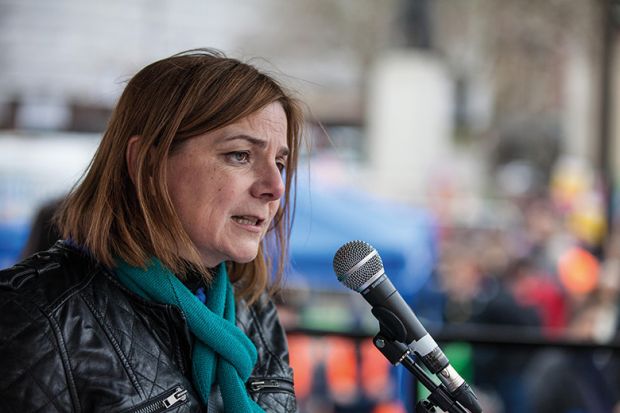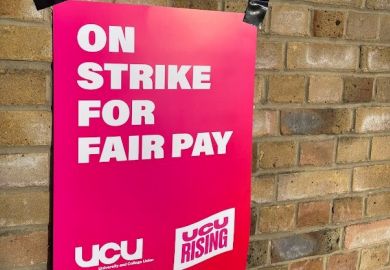The University and College Union’s failure to achieve the 50 per cent turnout threshold required for strike action must lead to conversation, rather than recrimination, about why so few members are voting in pay ballots, key figures in the union have insisted.
The calls for a national debate on union turnout follow the news, announced on 22 February, that only 41 per cent of UCU members voted on potential strike action over the 2 per cent pay offer for 2018-19, which rises to 2.7 per cent for lower-paid staff. That result came exactly four months after a near-identical turnout in a ballot announced in October. About 70 per cent of voters backed strike action in both ballots.
Meanwhile, the union’s general secretary, Sally Hunt, has resigned for health reasons, it was announced on 25 February.
Neither the second failure to reach the ballot threshold – introduced by the Conservative government – nor the decision to rerun the pay ballot, which was taken by a special UCU conference on pay in November, should lead to a bout of finger-pointing within the union, said Adam Ozanne, UCU branch secretary at the University of Manchester.
“The ballot results…indicate that those who thought we could beat the Tory anti-trade union legislation simply by working harder to get the vote out were overly optimistic,” said Dr Ozanne.
“This must not, however, become a blame game,” he continued, adding that “it must be about having an honest conversation” in which “we all reflect on the result and learn to listen to members”.
Dr Ozanne, who is one of three candidates running for national vice-president (higher education), added that last year’s pensions dispute, “in which 62 out of 67 branches succeeded in getting over the 50 per cent turnout threshold", showed "what can be achieved when we are united and members lead the campaign and negotiating agenda”.
Vicky Blake, UCU branch president at the University of Leeds, who is also standing for vice-president, said that it would be a mistake to “use the language of blame for the failure” to hit the threshold.
“We need a culture shift where people go and vote,” said Ms Blake, who said that the union should “take time to ask members in a structured way why they are not voting.”
She nonetheless defended the decision to rerun the pay ballot after the “awful timing” of the first ballot, which saw ballot sheets “arrive when people were away from their desks” after the end of summer term in 2018.
“I thought we would do a better job in a second ballot but voting fatigue might have counted as a factor,” she added.
Some commentators on Twitter have blamed the failure of UCU’s national leadership to swing behind the second strike ballot, claiming that it was wary of starting industrial action just a year after the pensions strikes of early 2018.
However, Matt Waddup, UCU’s head of policy, rejected that accusation, stating that the “union sent out more than a million individual communications to members and the outstanding work of branches probably doubled that”.
“Our activists and organising staff worked their backsides off knocking on tens of thousands of doors and phone banking,” he said, adding that the local “Get The Vote Out” strategy of most branches was “significantly improved compared with the first ballot and even with USS last year”.
“If we are serious about replicating our USS success elsewhere, we need to discuss and agree an underlying, long-term strategy that starts with the membership,” Mr Waddup added, stating that union members must “talk to each other rather than lock horns about what went wrong. We also need to talk to, rather than insult, those who did not vote.”
Michael Carley, UCU branch president at the University of Bath, also dismissed the idea that UCU’s central office was to blame for the poor turnout.
“Branches which succeeded in getting a high turnout did it thanks to a lot of local legwork, knocking on doors and local department-level networks,” said Dr Carley. He added: “I don’t see what national or even regional organisers have to do with that.”
Dr Carley, a member of UCU’s higher education committee, added that the resignation of Ms Hunt also meant that the union was likely to have a “genuinely healthy debate” about tactics and its general direction.
“This is the first election in UCU’s history when there is no incumbent – that opens the debate in ways that we have probably never seen before.”
POSTSCRIPT:
Print headline: Union’s vote failure ‘must not become blame game’
Register to continue
Why register?
- Registration is free and only takes a moment
- Once registered, you can read 3 articles a month
- Sign up for our newsletter
Subscribe
Or subscribe for unlimited access to:
- Unlimited access to news, views, insights & reviews
- Digital editions
- Digital access to THE’s university and college rankings analysis
Already registered or a current subscriber? Login









